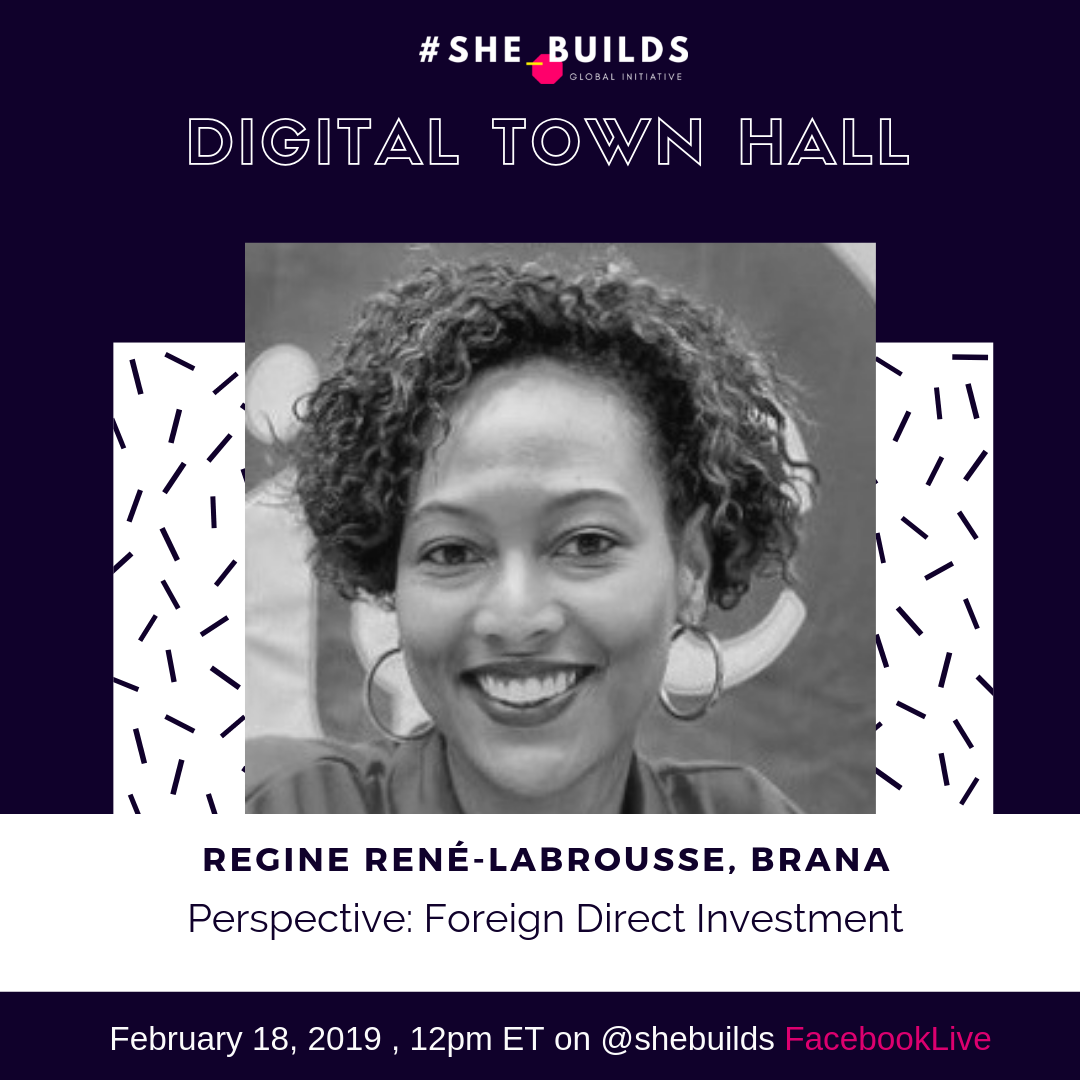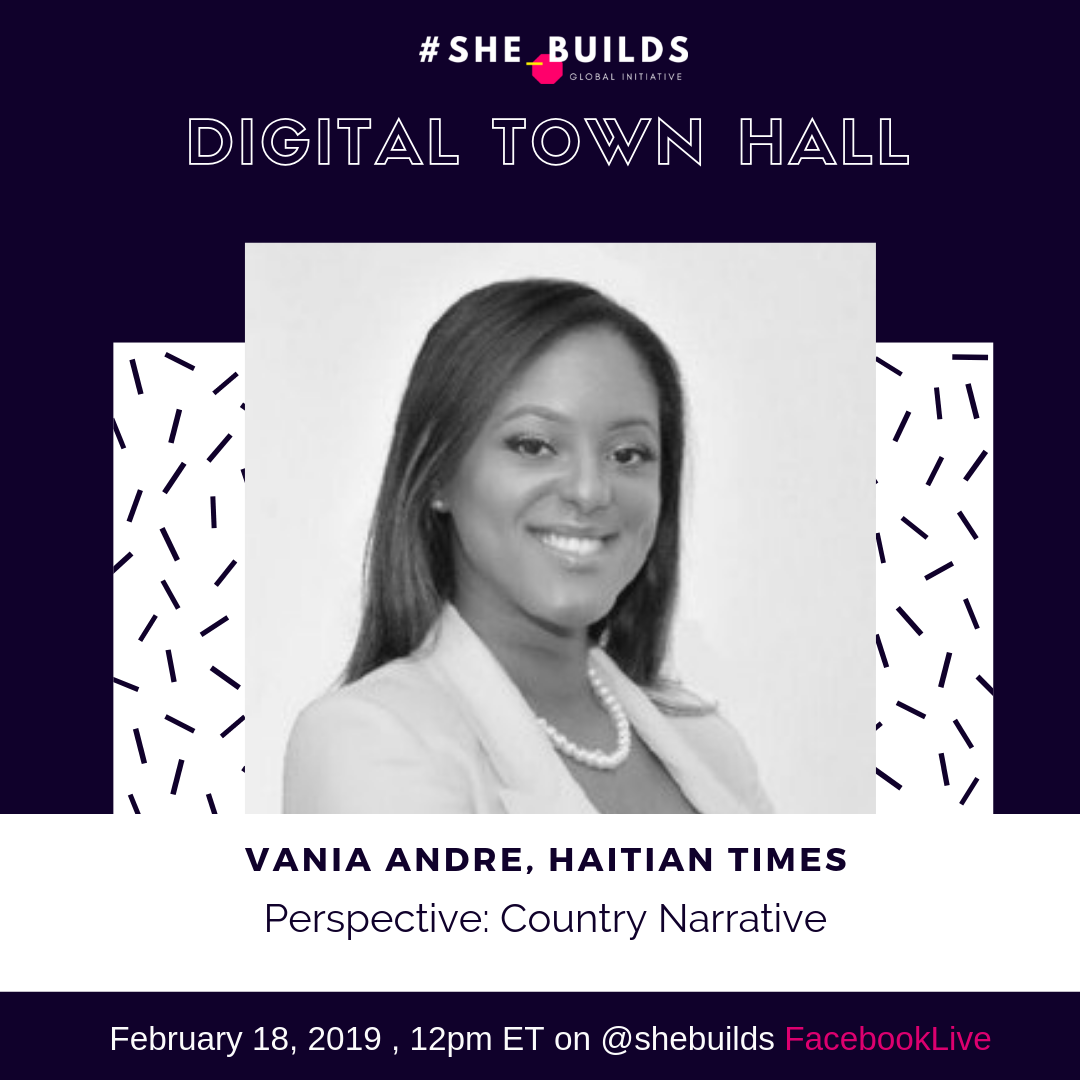[Digital Townhall] Perspectives & Impact of #HaitiLock on our Society
Discussion leaders:
Danielle St Lot |Impact on Local Production
Regine Renee-Labrousse | Impact on Foreign Direct Investment
Pierre Stanley Baptiste | Impact on the Entrepreneurship Ecosystem
Vania Andre | Impact on Country Narrative
Phalonne Pierre Louis | The Next Generation
Danielle Saint-Lôt | Impact on Local Production
Launched Smart Fanm Initiative
Summary of Discussion Points:
Many of us have been promoting our country and asking people to invest in Haiti. How will these events affect our local production?
Our local production in agriculture and textile were already destroyed because of the embargo.
We used to have 125,000 workers in the agricultural sector, but now we only have 30,000.
In 1 week, ten days, the economy is affected at all levels.
The agricultural sector is the backbone of the economy. The public markets are empty because of the violence. Because of the roadblocks, a lot of agricultural products have perished because they cannot be transported to market.
There is a company based in the South in Les Cayes, the manager had to leave the country with his family because they were attacked.
Certain companies will not be able to get back on their feet without a huge recovery effort.
Caribbean Craft, the largest craft exporter. The owner had 48 new clients from a trade fair in New York. They have been closed all week and have not been able to send clients samples. Caribbean Craft hires 120 local artisans who are paid for each piece that they make. The civil unrest affects these artisans and other workers as well. The company will likely miss their March shipment.
Carnival is a huge source of revenue. Craftsmen take out loans (microcredit) to produce costumes to sell. This turmoil will likely leave them indebted rather than profiting.
When you consider the mango industry (the third agricultural export of our country), the market is not going to wait for us, they will go to Mexico, India, and more stable economies.
The civil unrest poses a huge burden on our already weak local production.
Missing a season is the equivalent of losing a year of revenue for farmers.
We already have natural disasters, this human made disaster will only exacerbate things.
Consider the example of Rwanda and Benin who have experienced social stability and economic growth after tragedy.
We cannot say that Haiti is open for business if every two or three years we have to start over.
We do not have local buying power, so we need to export products.
What are the first steps towards progress?
Everyone needs to focus on what they can bring to a national dialogue and force our governments and civil society to start this dialogue. In small groups, we need to vomit what is not good. We need a collective vomiting process to dispel 200 years of anger. This is not only working through our current situation, but dialoguing through past traumas. We need to sit down together and do it quickly. Similar to the Justice and Reconciliation Process in Rwanda, collective communication is key. We need to have national dialogue around the problems that we currently have to move forward.
We have seen so much, we have lost so much that we have become desensitized to violence. We don’t have the number of psychologists in the country needed to treat even the people in Port-au-Prince.
There is a collective sickness that we need to address. We need to address two-hundred years trauma.
Regine Rene-Labrousse | Foreign Direct Investment
Corporate Affairs Manager and Sustainability Manager | BRANA
Summary of Discussion Points:
Given the current situation in Haiti, what has been the general reaction at BRANA?
People are disappointed, but not necessarily surprised.
Given the nature of the business, you have to think long-term. It is in the long-term that Heineken gets its returns on investments.
We are not so concerned with short-term hiccups. Companies should adopt a similar approach when operating in difficult markets.
We have also built a strong level mid-management to provide leadership in these times of uncertainty.
How are workers affected if at all?
The company typically operates 24/7.
We ultimately decided to shut down on February 7th and 8th to avoid putting our workers at risk.
We were able to communicate this to employees and to manage expectations.
We have 1,500 employees. We got all 1,500 employees onboard.
Does long-term sustainability apply to the company or employees?
At the end of the day, if your business isn’t sustainable, you are going to go out of business.
Integrated within the business strategy is the impact on the community, it is the impact on the livelihood of our employees.
We have built a clinic on site to ensure that workers have access to healthcare.
Key Takeaways
This environment is unpredictable, which makes it extremely challenging for business. The one thing that you can reliably predict is that the environment will be unpredictable, which allows you to manage expectations.
Communicating with employees is key, both before and during times of uncertainty.
Companies operating in Haiti should think long-term.
There is a growing need for mid-level management, would heavily encourage diaspora to come back to fill these roles
Pierre Stanley Baptiste | Entrepreneurship Ecosystem
Managing Director, Impact Hub Port-au-Prince
Summary of Discussion Points:
We need to reverse the entrepreneurial pyramid (development from the bottom-up)
Given the current situation in Haiti, you have to be able to manage your project remotely and to facilitate communication across teams using tools like airtable, slack, and trello. Get into a community group and use apps like Focus at Will.
Conscious mediocrity – a mindset to have when learning something new. People should practice “conscious mediocrity” by putting themselves in an environment that pushed them to grow. Only by willingly starting at a mediocre level, can we grow and get better.
Vania Andre | Country Narrative
Editor in Chief, Haitian Times
Summary of Discussion Points:
Within and outside of our community, news is being politicized and news is being sensationalized
Nothing in Haiti happens in a vacuum.
We need to move past passively engaging content, but today, with the speed at which we are receiving information, we need to be highly cognizant of what we are absorbing.
85-90% of readership for the Haitian Times is based in the U.S. and they are predominantly English speaking. But there is a growing readership out of Haiti.
We post content from le Nouveliste to reach Creole speaking audiences
The Haitian community isn’t a monolithic community, we have to acknowledge that we have different experiences.
HaitiInfo Project on twitter
Madame Bookman
Using T-Check to combat misinformation
Key Takeaways
We don’t want to change the country’s narrative, we want to make sure all layers are represented.
It is true, Haiti is one of the poorest countries in the Americas, but it is also true that we are one of the oldest countries in the Americas.
Nothing is black and white, it is not one or the other. We want to talk about Haiti’s different narratives.
Phalonne Pierre Louis | The Next Generation
Photojournalist, Fotokonbit
Summary of Discussion Points:
The protesters are not the ones creating violence, it is the authorities who have little respect for human dignity.
It takes the risks to capture what is happening in protests, a risk that I am willing to take.
The difference between resource poor and resource rich schools is stark. The education system as a whole is not favorable for everyone.
In terms of role models, I immediately think of Nelson Mandela and Martin Luther King. Few known examples of role models exist in Haiti for young people like myself to look up to






